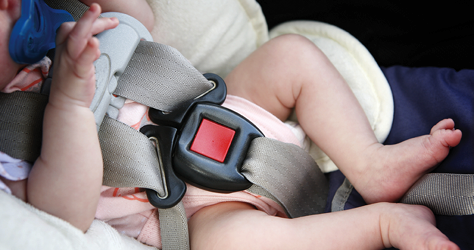Taking your baby abroad for the first time is an exciting experience
And with a little bit of sensible planning you can make sure your little one has fun and stays safe and healthy in a different climate.
At a glance
- A bit of prior planning makes travelling a lot easier
- Make sure you have appropriate travel insurance
- Keep little ones cool and out of the sun to protect their delicate skin

The first question you are likely to ask is what is the earliest age that you can travel abroad with your baby? The most sensible approach is to wait until they’ve had all their immunisation jabs before heading overseas. On a practical basis, many airlines insist that a baby and mum have a GP's note to say they are fit to fly, so check what your airline requires when you’re booking.
Jabs and insurance
If you are travelling outside Western Europe, North America and Australasia make sure that your baby has had the appropriate jabs for that destination. Always visit a health professional to get the appropriate advice and try and do so at least eight weeks before you travel.
Make sure you have appropriate travel insurance - infants under two are usually covered free of charge on a family policy but double check the small print and, if you are travelling in Europe, get a European Health Insurance Card [EHIC], which gives you and your baby access to free state medical care throughout Europe, you will need a separate one for your baby.
When taking off or landing we’ve all heard babies crying and this is often because they are in pain because of pressure build up in the ear. This can be avoided by giving them something to suck on, and obviously if you are breast feeding this is an option too.
Food and drink
Feeding babies abroad need not be more problematic than at home. Having a fridge in your room is incredibly useful; minibars suddenly have a much more practical function storing milk feeds.
If your baby is eating solids buy local fruit with protective skins but always prepare this food yourself. Mashed bananas, mango, pawpaws and other tropical fruit are full of vitamins and very healthy. Restaurants overseas will be usually more than happy to provide you with well cooked eggs, scrambled, boiled or in an omelette.
Keeping cool
If you’re in a hot climate, keep little ones out of the sun during the hottest part of the day. Follow the locals’ example and head off for a long, leisurely lunch, in the shade between twelve and three in the afternoon. Use the highest factor sunscreen and remember that the sun penetrates through clouds, particularly in tropical countries.
Take a cotton sleep suit to protect your baby against insect bites. It’s best to avoid taking a baby to an area where there are lots of mosquitoes.
Many hotels now offer a babysitting service, family friendly tour operators will be more likely to offer it and also ensure that the service has been properly vetted. Better still take them out to eat with you; the waiters will be very happy to see him or her.
Take a basic first aid kit with you including eye and ear drops. If you’re travelling in Europe most countries have excellent chemists many of which are very good at diagnosing and prescribing treatments for minor ailments. In more remote destinations, these treatments may not be readily available.